|
|
|
 |
Part One: History of the
Julio-Claudian Emperors
Story written
by Rick Archer
November 2009
|
|
THE TALE OF
SIX
CAESARS (and one near miss)
1 Julius Caesar - The
Man Who Ended the Republic
2 Augustus Caesar - The Man Who Was
First King
3 Tiberius - The Man Who Did
Not Want to be King
4 Sejanus - The Man Who
Barely Missed becoming King
5 Caligula -
The Man Who Should not Have
been
King
6 Claudius - The Man
Who was too Stupid to be King
7 Nero - The
Monster Who Ended the Julio-Claudian Line
|
Forward
You have all heard of ambition gone mad, corruption, and dirty
politics. You have all heard of political assassination. You
have all heard of sexual perversion, cruelty, and debauchery.
This story has it all. So where do you want me to start?
American politics can
be pretty rough sometimes, but we cannot even begin to hold a candle
to the Romans. There is no way to explain how stunning some of
these stories are. I could barely comprehend or believe some of the
stories I read while researching for this article.
Now I am going to
share them with you. If there is one word that could describe this
era, it would be "excess." The Romans did everything to
excess. Too much killing. Too much sex.
And too much cruelty.
Endless cruelty.
Look no farther than
the savage blood sport recreation of the Romans - watching slaves
bash their comrade's brains in during gladiatorial contests,
watching defenseless Christians slaughtered by fierce animals,
torturing criminals in public for amusement, watching helpless
animals abused in all sorts of hideous ways, laughing and jeering at
the suffering - and you begin to comprehend this was a
horrible, violent society.
Why they call it the
"Roman Civilization" is a mystery. These people were NOT
civilized.
These events occurred
two thousand years ago. Therefore I cannot promise that
everything I have written is the truth since I had no choice but to
rely on the accounts of others before me.
You can assume,
however, that everything I write was faithfully copied from research
I did on the Internet. My main source, of course, was the
amazingly helpful Wikipedia.
What I mean to say is
that no matter how outrageous the story is, you have my absolute
promise I did not make it up. I read it, gasped in amazement,
then looked at several more sources to see what they had to say.
I found there is strong consensus on even the most outrageous of
tales. And now I am passing it on to you.
This is a long
tale. Let me assure you of one thing - once you start reading
it, you won't want to stop. RA
This story is told in
four parts.
|
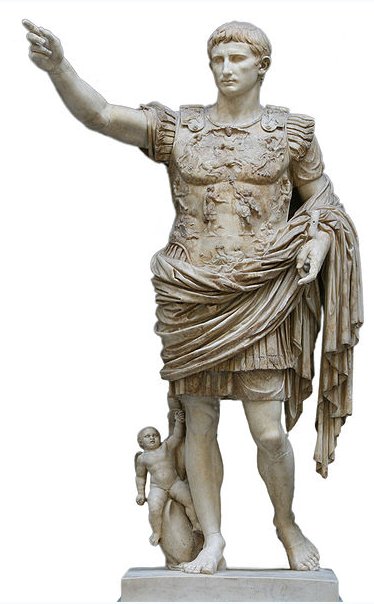
Augustus Caesar, the Greatest of them All
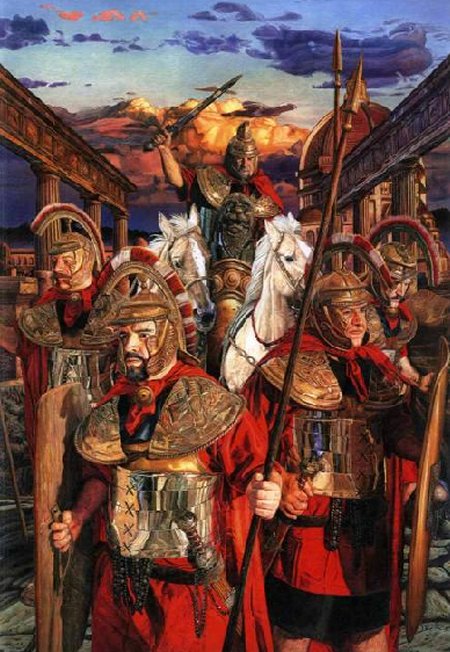 |
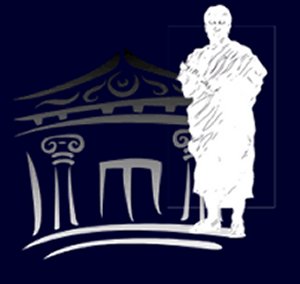 |
The
Julio-Claudian Dynasty
The term
Julio-Claudian Dynasty refers to the series of
the first five Roman Emperors. These men ruled the Roman
Empire from 27 BC to AD 68, when the last of the line, Nero,
committed suicide. The dynasty is so named from the
family names of its first two emperors: Gaius
Julius
Caesar Octavianus (Augustus) and Tiberius
Claudius
Nero (Tiberius). The ruling line was founded upon an
alliance between these two families.
The
5 Emperors of the Dynasty:
1.Augustus ( 27 BC– AD 14)
2.Tiberius (14– 37)
3.Caligula (37– 41)
4.Claudius (41– 54
5.Nero (54– 68)
|
|
1 Julius
Caesar - The Man Who Ended the Roman Republic
"Sic
Semper Tyrannus!" - Death to all Tyrants
The story of
the Julio-Claudian Line begins with Julius Caesar.
Gaius
Julius Caesar was one of history's most prolific
conquerors, battling through Spain, Gaul, Germany,
Britannia, and Egypt. More than any other leader, he
was responsible for the creation of the remarkable Roman
Empire. Yet for his efforts, he was assassinated on
the Ides of March in 44 B.C.
|
|
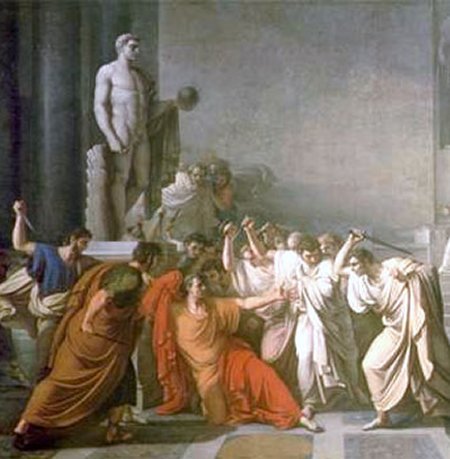 |
Caesar wasn't just murdered, he was brutally pummeled in an
incredible act of passion by a huge mob of men. 60 men known as the Liberators
participated. After all, a single knife in the right place
would have done the trick, but Caesar
received 23 stabs wounds from the Conspirators before succumbing.
This was as clear a case of "overkill" as you will ever
find.
Why?
Most
school books will tell you that he was murdered due to his brutal
policies, his despotic leadership, and the desire to become the
supreme ruler for life. Headed by Marcus Junius Brutus
and Gaius Cassius Longinus, the Liberators firmly
believed they were doing Rome a favor. Afterwards, Brutus and his
companions marched to the Capitol while crying out to their
beloved city: "People of Rome, we are once again free!"
You would have
assumed that Caesar would have had higher approval ratings.
After all, by most accounts, he was doing a pretty job of
transforming Rome into something good. In truth, Caesar was
one of Rome's greatest leaders, passing a number of historic reforms
that saved society from total collapse. His employment reforms ended
the economic stagnation caused by the influx of slaves. By
changing the amount of power creditors had over the citizens, people
were able to pay off their debts. Thanks to Caesar, things were steadily
improving for Rome. Employment in the city was up, security and
confidence were up, people were entertained by the gladiator games,
and the economy was stimulated with import and export. People
were generally simply happy with the way life was going.
So
why did they assassinate Caesar? It all goes back to the
founding of Rome in 753 BC.
|
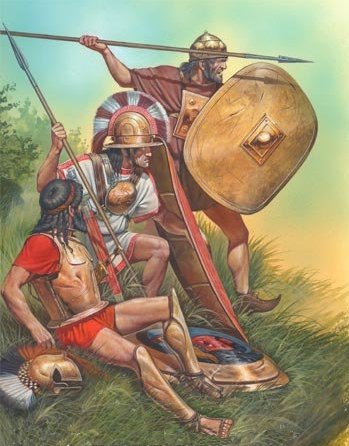 |
First Came the
Etruscans
Caesar was
assassinated because he was the man who dared to change Rome
from a Republic to an Empire. In so doing,
Caesar hit a deep nerve. Many Romans were deeply paranoid
about giving too much power to one man. They had good
reason. To understand
Rome, you have to go back 750 years to the hated Etruscan
kings who ruled Rome during its infancy.
According to tradition, Rome was founded in 753 BC by the
twins Romulus and Remus. These men were the leaders of
an invading tribe known as the Etruscans.
Prior to the
Etruscans, this area on the Tiber River had been a small,
inconspicuous town. Then in 753 BC, out of nowhere,
a powerful tribe known as the Etruscans moved into
town and took over. About a hundred years earlier,
the Etruscans had migrated from Asia Minor over to Southern
Italy. Gradually expanding northward from the Bay of
Naples, the Etruscans organized the backward Italic peoples
into a loose confederation of Etruscan-dominated
city-states. Rome had become just the latest victim in
the shadow of Etruscan expansion. Before they were
free. Now they had rulers.
From the very
start, Rome was bathed in violence. During an
argument, Romulus killed his brother. No one knows
what the argument was about, but I suspect they couldn't
agree on what to call their new city. Remus' death
solved that problem nicely. Romulus decided to name the city
after himself.
|
Now that he
was in charge, Romulus didn't waste any time. This
town lacked fortifications, so it was vulnerable to attack.
Romulus put the conquered people of Rome to work in a
massive building project.
In short order, Rome had grown from a village to a city.
It was now
the largest city in the area.
Just like a
modern boomtown, people from around the countryside flocked
to the area in search of work and adventure. There was
one problem - almost all the newcomers were nomadic single
men.
|
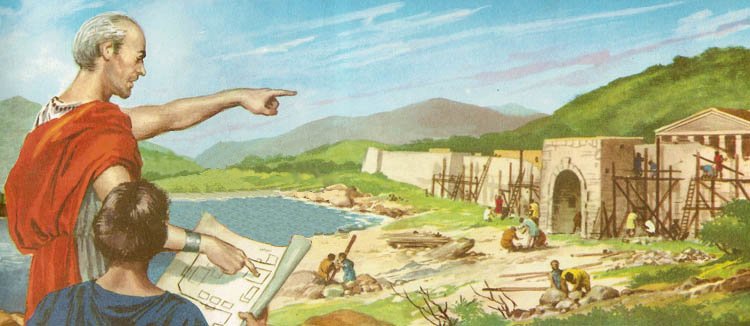 |
This problem
led to the
incident with the Sabine women. Rome's population
growth was stagnating because there weren't enough women.
Romulus petitioned the surrounding tribes for rights to
intermarry. Despite his efforts, the Roman requests were all
met with stern declination. Leave our women alone.
Romulus decided that if the neighboring towns would not
share their women, Rome would take them. The Romans hid
their dismay and pretended to be friends with their stingy
neighbors. Then they resorted to trickery.
Romulus sent
out word that they would hold the grandest festival and
greatest games in a celebration to honor 'Equestrian
Neptune'. He made sure the spectacle was thoroughly announced to
the neighboring peoples. He gave the event great publicity
by the most lavish means possible in those days.
Excited at the prospect of such a festival and curious to
get a glimpse of the new city, the surrounding tribes
flocked to Rome.
|
The visitors
were received with hospitality in the houses. After
having seen the position of the city, its walls, and the
large number of buildings, they marveled that Rome had grown
so fast.
The Sabine
people came in the greatest number, bringing their wives
and children. All were hypnotized by the great city; the men
ready to compete against its builders in the games, the
women and children anxious to watch.
When the games began and all were distracted, the signal was
given. Suddenly the Roman men stopped whatever they were
doing and rushed after the young maidens,
mostly the women of the Sabine. They swept them up and
carried them off in all directions to their homes. Startled
at the sudden violence,
most of the visitors fled, leaving their women at the mercy
of the Romans.
You have to assume the most barbaric of the
Roman men won the
initial mating privileges because their offspring would go
on to carry the 'vicious gene' through many generations.
The Destiny of Rome would be one of brutality and blood lust
for many centuries to come.
|
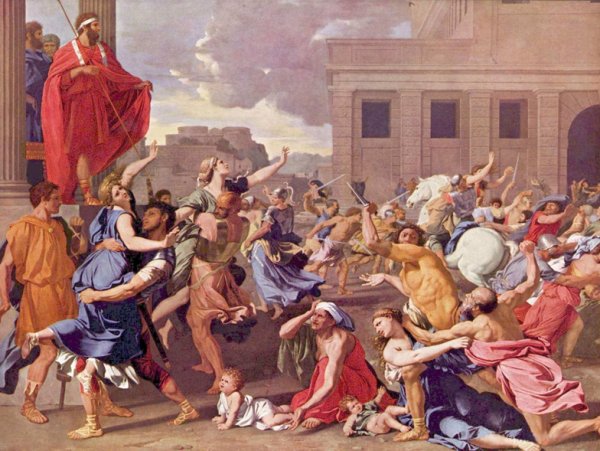 |
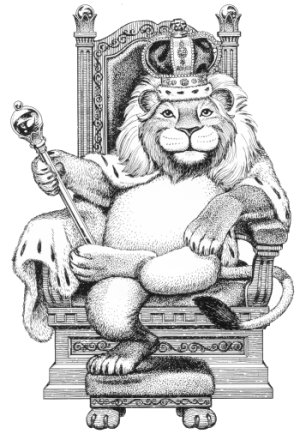 |
Rule of the Hated Etruscan Kings
Romulus was the first of seven Etruscan
Kings that would rule Rome. One of the most
important features of the Etruscan dynasty was the increase
of the kingly power. All the Etruscan kings were powerful,
ruthless rulers.
Although
everyone wishes to be free, you can't help but note that
without the Etruscan influence, Rome would never had
amounted to anything. The massive building project
begun by Romulus turned Rome from a village into a city
which in turn led to a rapid population growth.
Furthermore, the
Italic people were more or less peaceful, but the Etruscans
changed that attitude quickly. They gave to Rome a certain kind of strength and influence
which it did not have before. Mostly
the kings mistreated the citizens so badly that over time
they began to grow a backbone. Resentment has a way of
doing that.
The great power of the Etruscan
kings was at first used for the good of the people,
but unchecked power corrupts. Etruscan Rule
became a tyranny which was oppressive and hateful.
For 250 years, the Roman people
chafed under the rule of these outsiders. Finally, in
509 BC, the last Etruscan
king was expelled.
This moment
marked the birth of the Roman Republic.
The ejection
of the Etruscan kings brought about the establishment of a
Republican government in Rome
that allowed all citizens to participate. Once
the monarchy was abolished,
a decree was passed
that there would be no more kings in Rome.
|
Their next step was to establish a
constitution. Roman Law became a way the citizens
could find protection from complete domination by the elite.
Then they elected Senators to oversee Roman Law.
At the time of the Etruscan overthrow,
the Senate had already been a part of Roman
life for some time. The
Senate had been formed
under the Etruscan kings
as an advisory council with no real
power. Now the Roman people
looked to their Senate for leadership. The
Senate appointed two
consuls,
patrician men who would rule Rome
like a king, but only for one year.
This
limited rule was a wise idea.
The two consuls ruled
carefully and not as a tyrant, for they
knew that otherwise they
could be punished by the next consul once his year was up.
The word 'Republic'
itself comes from the Latin (the language of the Romans)
words 'res publica' which mean 'public
matters' or 'matters of state'.
This new 'Republic' experiment turned out to be pretty
successful. It lasted from 510 BC until 23 BC - almost
500 years. By comparison, the government of the United
States of America has only existed since 1776 - less than
250 years!
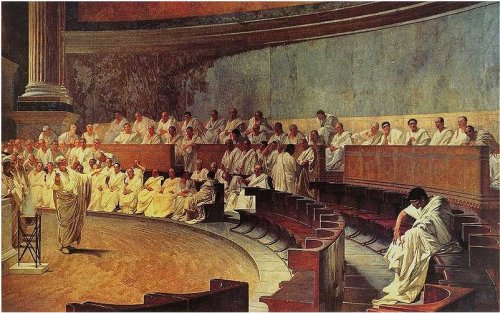
Cicero denounces Cataline in the Senate
(painting by Maccari) |
Era of the Roman Republic
- A Brief History
510 BC until 23 BC.
These 500 years marked
the
Era of the Roman Republic,
the time when Rome was
ruled by its citizens.
This was the period that witnessed the great
expansion of Roman power and civilization.
The Roman Empire was an accident, so to speak.
The seeds of the Roman Empire were formed
during the Era of the Roman Republic as
the city became fanatical in its
pursuit of security.
The
history of the Republic involved continuous warfare. All
of the historical events which
shape the tradition of Roman
valor date from this tumultuous
period of constant defense and invasion.
|
Only in
the later stages
of the Republic did building the Roman
Empire become a deliberate
objective. In the beginning,
Roman Power started as a defensive strategy. As
Nietzsche once said, "That which doesn't kill you makes you
stronger." Having been conquered once, the Roman
people were determined not to see it happen again.
250 years of domination had left a large collective chip on
their shoulder. Fortunately, that infusion of angry
Etruscan blood had turned the Romans into warriors
themselves. Immediately the Romans built up their armies to fend off any
threat of further Etruscan invasion.
Originally, the wars which the Republic fought were
largely defensive wars; the expulsion of the
hated kings provoked many
counter-attacks by
the Etruscans
and their allies. Soon, however, the Romans were
moving to gain control over neighboring territory in order
to further neutralize the threat
of attack. Their logic was that control over these
territories would obviate any potential attack from the
people occupying those territories and at the same time
provide a buffer region between themselves and potential
attackers. Roman conquest, then, was pursued largely for
Roman security; the end result of this process would be,
first, the conquest of the entire Italian peninsula, and then the conquest of the world.
After the Etruscan overthrow, it took the
Romans about 100 years to conquer Italy. After the Romans had essentially annexed all of Italy,
they found further expansion would be much more difficult.
Their progress in the north was checked by the Gauls, a
fierce, warlike people of Celtic descent. The Gauls
dominated the area we now know as France, Switzerland, and
Northern Italy. The Gauls didn't appreciate being
attacked by the Romans. They decided to retaliate. In 387 BC,
the Gauls roared across the Alps into Italy, soundly
defeated the Roman army, and then captured and burned Rome to
the ground. It took Rome 50 years to recover any
semblance of its former might.
Beaten once by the Etruscans, beaten a
second time by the Gauls, the Romans reformed as a powerful
military state. They immediately went about
reconquering Italy. They took out all remaining
Etruscans plus any Gauls that had lingered in their
territory. By 265 BC, Rome was now in control of the Italian
Peninsula. Twenty years later, Rome turned its attention to its
enemy in the south - Carthage,
a powerful
adversary from across the sea (modern day Tunisia).
The Punic Wars with Carthage
The
Roman fight with Carthage began over the control of Sicily,
a large island off the coast of southern Italy. Carthage owned
it; Rome wanted it. In 241 BC,
Rome eventually prevailed in a prolonged battle known as
The First Punic Wars.
Twenty
years later, a brilliant Carthaginian commander known as
Hannibal nearly put an end to the budding Roman Empire.
In September of 218, he crossed the Alps with his army and
entered Italy on a war of invasion. Although his army was
tired from the long trip, he literally smashed the Roman
armies he encountered in northern Italy using a most unusual
weapon - elephants!
Hannibal's victory over Rome, as he saw it, would be
guaranteed by convincing Roman allies and subject cities to
join Carthage. After all, everyone loves to kick a
bully when he is down. These spectacular victories
brought a horde of Gauls from the north to help Hannibal,
50,000 or more. Hannibal couldn't be stopped!
Terror gripped Rome.
|
 |
Desperate, they asked Quintus Fabius
Maximus to become absolute dictator of Rome. The Romans
weren't sure that they could beat Hannibal in open warfare.
Therefore Fabius was determined to avoid open warfare at any
cost. His strategy was to simply harass the
Carthaginian army until they were weak enough to be engaged
with openly. However, when Hannibal marched into
Cannae and started decimating the countryside in 216 BC,
Fabius sent an army of eighty thousand soldiers against him.
This army was completely wiped out, the largest defeat Rome
ever suffered. Roman allies in the south of Italy literally
ran to Hannibal's side; the whole of Sicily allied itself
with the Carthaginians. In addition, the king of Macedon,
Philip V, who controlled most of the mainland of Greece,
allied himself with Hannibal and began his own war against
Roman possessions in 215 BC. This was Rome's darkest
day.
The situation seemed nearly hopeless for the Romans.
Fabius had been so chastened by his bitter defeat that he
absolutely refused to go against Hannibal again.
Hannibal's army moved around the Italian countryside
absolutely unopposed. Hannibal, however, couldn't find a way
to put a stake through Rome's heart. Once the Gauls
had their victory and their plunder, they returned to the
north. Hannibal had indeed wreaked great havoc on
Italy, but was so far isolated from his supply lines that
his army lacked a finishing kick. His army was far too weak in numbers and in
equipment to conquer an entire country singlehandedly. Hannibal
couldn't be beaten, but at the same time he didn't have
enough soldiers to lay siege to cities such as Rome nor did he
have the men or equipment to storm those cities by
force. All he could do was roam the countryside and
lay waste to it. This kept his men well fed, but
basically spinning their wheels in the process.
The Romans had
lived to fight another day. They knew they couldn't
beat Hannibal face to face. However, Hannibal's
failure to attack their city gave them time to regroup.
Once they began to understand why he couldn't attack Rome,
they decided to fight the war through the back door.
Hannibal was dependent on Spain for future supplies and men,
but he had left the defense of Spain in the hands of
inferior generals. A
young, strategically brilliant man known as Scipio was put
in charge of the Roman army. Scipio soon conquered all
of Spain, leaving Hannibal high and dry in Italy.
Scipio then crossed into Africa in 204 BC and took the war
to the walls of Carthage itself. This forced the
Carthaginians to sue for peace with Rome; part of the treaty
demanded that Hannibal leave the Italian peninsula. Hannibal
was one of the great strategic generals in history;
during his war with Rome he never once lost a battle. Now,
however, he was forced to retreat to save his home country.
Although Hannibal had won every battle he fought against
Rome, Carthage had ultimately lost the war.
When Hannibal returned to Carthage, the Carthaginians took
heart and rose up against Rome in one last desperate roll of
the dice. In 202 BC, at Zama in northern Africa,
Hannibal fought against Scipio and his army. Now
Hannibal met his
first defeat. Afterwards, the
terms Carthage acceded to were so punishing that it was
never able to challenge Rome for supremacy of the
Mediterranean again.
Rome
controlled the whole of the western Mediterranean as well as
northern Africa.
World
Domination
This was the defining historical experience of the Romans.
They had faced certain defeat with toughness and
determination and had won against overwhelming odds. For the
rest of Roman history, the character of being Roman would be
rooted in the histories of this desperate war against
Carthage. The Second Punic War turned Rome from a regional
power into an international empire: it had gained much of
northern Africa, Spain, and the major islands in the western
Mediterranean.
In addition, Rome had a new score to
settle. Because Philip V of Macedon had allied himself
with Hannibal and started his own war of conquest, after the
Second Punic War, Rome turned east in wars of conquest
against first Philip and then other Greek kingdoms.
The end result of the Second Punic War marked the beginning
of the domination of the known world by Rome.
|
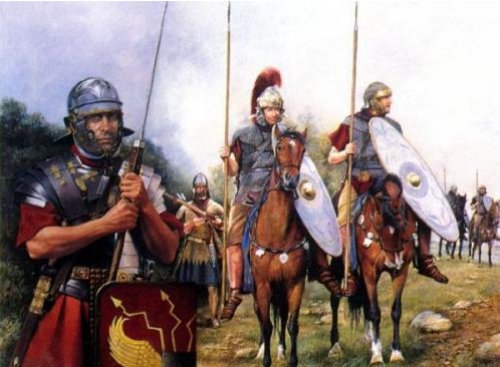 |
Ancient
history has shown that it is enormously difficult to hang
onto conquered territories. The Romans, however,
seemed to have figured out how to peacefully hold onto
conquered territory with both liberal and militaristic
policies. First, Rome didn't destroy conquered cities, but
granted them certain rights. Some cities were allowed full
Roman citizenship, particularly those near to Rome. Others
were allowed certain Roman rights. Some were allowed
complete autonomy. Some were allowed to become allies
without war, Egypt for example.
All, however,
were required to send Rome taxes and troops. In addition,
Rome settled soldiers on the captured lands as payment for
their service. Some of these land grants were especially
lucrative. The soldiers got land wealth, and the Romans got
permanent military settlers in the conquered lands. In this
way, Rome was able to maintain a permanent military
settlement in every conquered land. In order to reinforce
these settlements, the Romans began an ambitious
road-building project. Their roads were of the highest
quality and went in straight lines—right straight over
mountains in fact—so that soldiers and supplies could be
quickly moved into rebellious territories.
The response to
any revolt was swift and harsh. So the combination of granting
conquered territories rights and citizenship (or the promise
of future rights and citizenship) and the surety of a swift,
harsh response to rebellion gave a compelling reason to
simply "accept" Roman Rule. This produced a lasting, peaceful
empire throughout their vast territories.
It took Caesar ten years to conquer Gaul
(France), but once he succeeded, the Roman Empire had
reached the pinnacle of its power. It was an amazing
accomplishment.
|
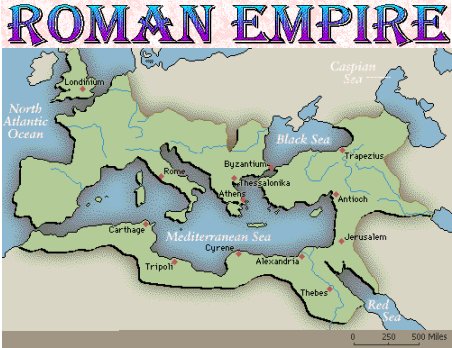 |
|
|
|
| |
THE ROMAN EMPIRE
Now the
political structure of Rome at this crossroad in
time centered on the conflict between
Republic and Empire.
For 250 years, Rome
had been dominated by the tyrannical rule of the Etruscan Kings.
For 500 years, Rome had achieved remarkable success as a
Republic. By
placing power in the hands of the people, via the
Senate,
all citizens were allowed to participate in
government.
However the presence of Julius
Caesar threatened to put an end to the Republic. Caesar's Empire would have all governmental power vested in a single
talented ruler.The
power elite wished to preserve the Republic.
Julius Caesar was assassinated because he had become so powerful
that his political enemies feared what he would do next. Maybe
they had best stop him while they still could.
|
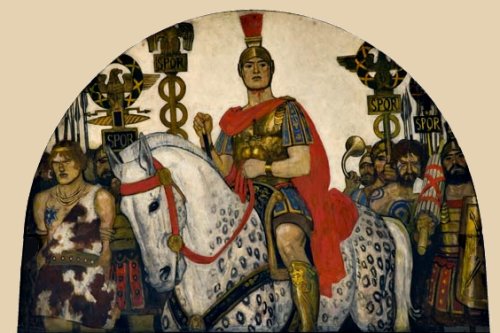 |
|
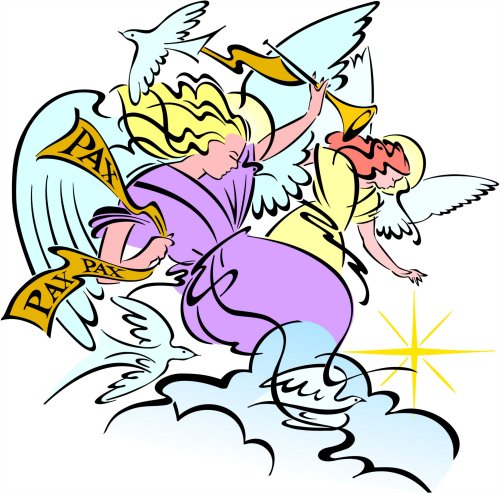 |
As Americans raised on the principles of democracy, I suppose our
sentiments would naturally tend towards the Republic as the ideal.
However,
the ideal is not always what it seems to be. In reality, Rome had grown too big for lots of people
to handle its vast affairs any longer by committee. People had become so greedy
and so ambitious that their constant power struggles had made
governing this vast enterprise nearly impossible without central
authority.
The Empire had
grown so large that in the final days of the Republic, Rome had
become a state of constant civil
war and chaos for 100 years! Placing all power in the
hands of one talented person was Rome's best bet to get people to
cooperate again and be able to maintain its dominance over the world
An Emperor of Rome,
i.e. the rule of one man, though problematic,
would put an end to the constant civil wars and
provide stability and prosperity to all Roman territory.
The superiority of the
rule of Emperor was proven not once, but twice. Acting as
dictator, Julius Caesar had singlehandedly gotten Rome's economy
working again.
Furthermore, Julius Caesar's successor,
Augustus Caesar, instituted reforms that firmly established
Rome as the
world's leader.
Thanks to his largely benevolent rule, Augustus established a period
of peace known as Pax Romana that lasted for
two hundred years (27 BC to 180 AD).
|
2 Augustus Caesar - The Man Who Was
First King
Augustus Caesar
was a remarkable ruler. He brought social stability to a region plagued by
constant warfare.
Although Roman leaders were forced to extinguish occasional
rebellions during this period (for example the Great Jewish Revolt
of 68 AD), the interior of the Empire was left
completely untouched by civil war or attack by invaders from the perimeter.
To create 200 years of peace in this brutal age was a remarkable
accomplishment! Although much attention has been given to the tyrannical and often vicious leaders
like the Emperors Caligula and Nero, most of the Roman emperors ruled sensibly
and competently for the next 200 years.
The Republic system
of government had helped Rome grow, but once it became too big, it
was the re-introduction of one-man rule that took Rome to its zenith of power. Thanks first
to the groundwork of Julius Caesar and then to political prowess of
his talented nephew, The Augustan
Age became a time of lasting prosperity throughout the
Mediterranean.
|
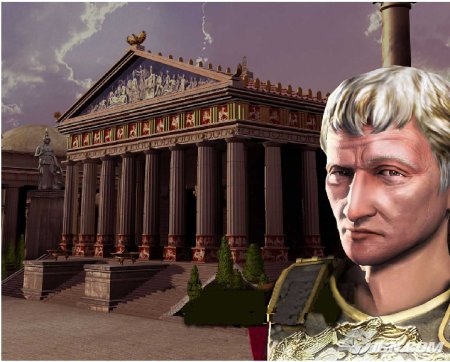 |
A Brief Rant -
Democracy versus Autocracy
Rick Archer's Note:
I am about to share a
couple of my own thoughts on politics. If these ideas offend anyone,
please forgive.
I happen to prefer the American system of Democracy. I don't
want to be ruled by a King any more than the next person. I
want to have a choice in who my leaders are. Even if my vote
is just one in 200 million or so, I am also reassured that I can
help throw the bum out if we pick the wrong person for a job.
However, at the same time, it is pretty obvious that Democracy has
serious shortcomings. My biggest criticism of Democracy is
that it requires constant compromise to make it work.
Compromise
makes a good umbrella, but a poor roof; it is a temporary
expedient, often wise in party politics, almost sure to be
unwise in statesmanship. James
Russell Lowell
If you set out to
be liked, you would be prepared to compromise on anything at any
time, and you would achieve nothing.
Margaret Thatcher
A compromise is basically a concession where no one wins, no one is
happy, but you can live with it. A compromise does allow
improvements to be made, but only in bits and pieces. If
something is seriously wrong with no clear solution - health care
for example - a type of stalemate kicks in. Little
progress is made. Thanks to our system of checks and balances, no
one has enough authority to make needed changes swiftly.
Instead, slowly but surely a "consensus" must be built. The
end result is usually some lukewarm solution that pleases very few.
Deep down, everyone suspects the same problem will have to be
debated again down the road.
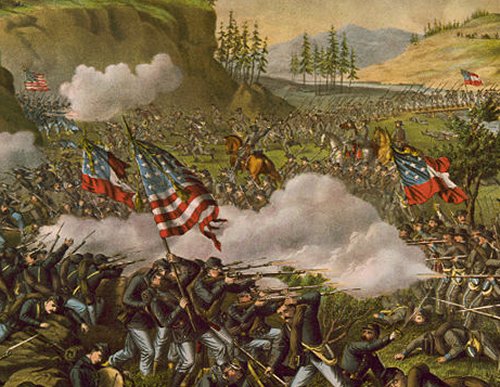 |
Furthermore, thanks to the endless rounds of committees and debates,
the speed of needed changes is often "glacial" at best. The
patient bleeds to death while the doctors argue over the best course
of action. Democracy does have its drawbacks.
The best example of the weakness of compromise is "Slavery".
Thomas Jefferson got it right when he said all men are created
equal, but the Southern States refused to sign the Constitution
unless their slave rights were guaranteed.
To get the
Declaration of Independence signed, the Northern States were forced
to give in. The consequence of
this particular "compromise" is known as the Civil War.
You
might say that if Thomas Jefferson had been Emperor at the time, a
lot of suffering could have been avoided. But at the same
time, wasn't the American Revolution about getting rid of Kings to
begin with?
|
Another example where "compromise" was
definitely not in our best interests was
the onset of World War II. During Nazi Expansion, many
American leaders were strongly opposed to American intervention in
that "European Squabble" way overseas.
"It's not our war!"
cried the leaders who preferred to stay neutral. These leaders made sure that Franklin
Roosevelt's hands were tied. Meanwhile, Great Britain was
getting hammered by the Luftwaffe in the Battle of Britain. Great Britain was the only
European country still left to stand in the way of Hitler's war machine,
but the country was just barely hanging on. Following Dunkirk,
Britain was under threat of invasion. The Royal Air Force
was badly outnumbered by the German Luftwaffe, but somehow
managed to hold off the superior forces long enough for
America to join the fight.
The correct action was to join the war immediately before it
was too late, but FDR found he did not have the political
consensus necessary to take America into the fight. Instead, FDR was forced to
deceive Congress in order to do the right thing. He used the devious
trick of "loaning" vital supplies to his friend Churchill and Great Britain.
Thank goodness! Without American help, Great Britain would surely
have fallen. Fortunately, the Japanese mistake of bombing of Pearl
Harbor brought our nation to its senses. American joined the
fight and turned the tide. Otherwise, you and I would
be speaking German now. Or maybe Japanese. So
much for "compromise".
|
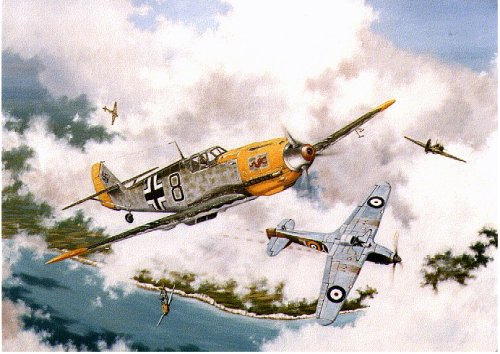
Never was
so much owed by so many to so few
|
If a nation is fortunate to have someone as gifted as Augustus
Caesar running its affairs, then definitely a benevolent
dictatorship is the strongest form of government. However, the
dark side of Autocracy is what happens when you give this kind of
power to the wrong people. You see, after the death of
Augustus Caesar, for the next 50 years the Romans lined up one monster after another to
take the throne. The four men who succeeded Augustus were so pathetic that no
one in
their right mind would ever approve of an Autocratic system given
the choice.
 |
The story of the Julio-Claudian Line of Emperors will forever serve
as testimony to why our American Founding Fathers got it right.
They
could easily have established George Washington as the First
American King (and many people wanted to). However, thanks to the
lessons learned from the results of
the "Roman Emperor System", they chose Democracy - with all its
inherent weaknesses - instead. Thank goodness.
Our American
Democracy isn't always pretty and it definitely isn't
perfect, but it is definitely better than the alternative.
Autocracy is simply too big of a gamble. When we do
occasionally get it wrong - Richard Nixon for example - at
least we aren't stuck with the mistake for life like the
Romans were with their Emperors.
|
Although brilliant
politicians like Augustus
Caesar do come along once in a millennium, people like Tiberius,
Caligula and Nero come along much more frequently. The stories of
these monsters in human form serve as the main reason why Democracy is
clearly the
better path to take.
|
|
|